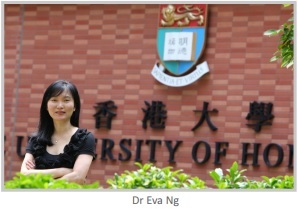Knowledge Exchange
What’s the Chinese For ‘Grexit’?
中文
A new website launched under the School of Chinese is providing interpreters, students and the public with a bilingual repository for translating terms from the news and other everyday sources that have not yet made it to the dictionary.
The “Resources for Interpreting” website has received more than 5,000 visits since its launch in July, as well as positive feedback and endorsements from scholars and professional interpreters in Hong Kong and abroad.
Dr Eva Ng instigated the website after spending more than a decade asking students to submit Chinese-English bilingual terms from the news on a weekly basis, which she compiled into a list and kept on her personal website. That list became the basis for the website’s searchable glossary database.

“I’m a former court interpreter and I know glossary compilation is an indispensable part of the practice of interpreting. Students in my interpreting class often come across terms that they don’t know the equivalent of in the target language, so it’s very important for them to have an extensive vocabulary in both languages and to build up that vocabulary from daily life,” Dr Ng said, citing buzzwords such as “Grexit” and “smartphone addicts.”
The bilingual glossary is turning out to be useful to more than students and teachers. Even professional interpreters use it as a handy toolkit.
The website also contains information on the practice, learning, teaching and research of interpreting, developed in collaboration with scholars from the University of New South Wales and Hong Kong Baptist University. “I wanted to create a website where all the information about interpreting is a click away,” Dr Ng added.
Dr Ng received two Knowledge Exchange Fund grants, one to set up the website in the 2014-15 academic year and the other to sustain and expand it during the current academic year. “It’s meaningless if we stop here, especially for bilingual terminology. You have to update it regularly to make it useful, so this continued support from the KE office is important,” she said.
Apart from news sources, Dr Ng and her research assistants have also drawn terminology from court proceedings that she obtained through her other projects. In 2009 she was given rare permission by the High Court to access the audio recordings of nine trials for teaching and research purposes. She received a grant from the Leung Kau Kui Research and Teaching Endowment Fund in 2009 and a Teaching Development Grant in 2014 to transcribe and develop the materials.
The recordings contain terms relating to such things as triad slang and sexual offences, which have been added to the website. The transcripts have been used in class to let students test themselves against the court interpreters and critique the professionals’ work, and in a mock trial with the Faculty of Law. Students have also visited the High Court to see interpreters live in action.
“I try to bring in authentic materials and give students a chance to learn from real people rather than just listening to a tape,” said Dr Ng, who hopes to further develop these court-based tools, as well as the website, to bridge the ever-evolving complexities of English and Chinese.
Resources for Interpreting is at www.interpreting.hku.hk.

